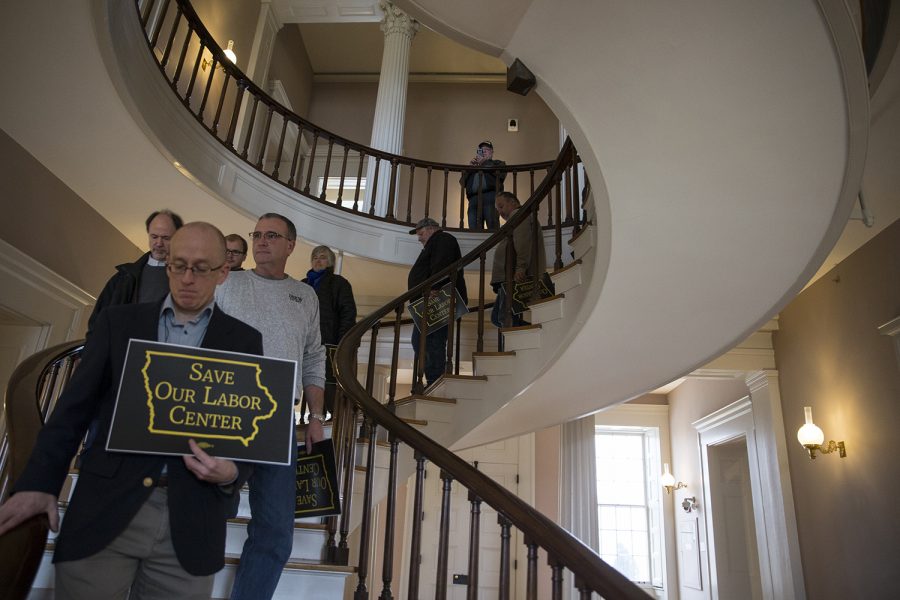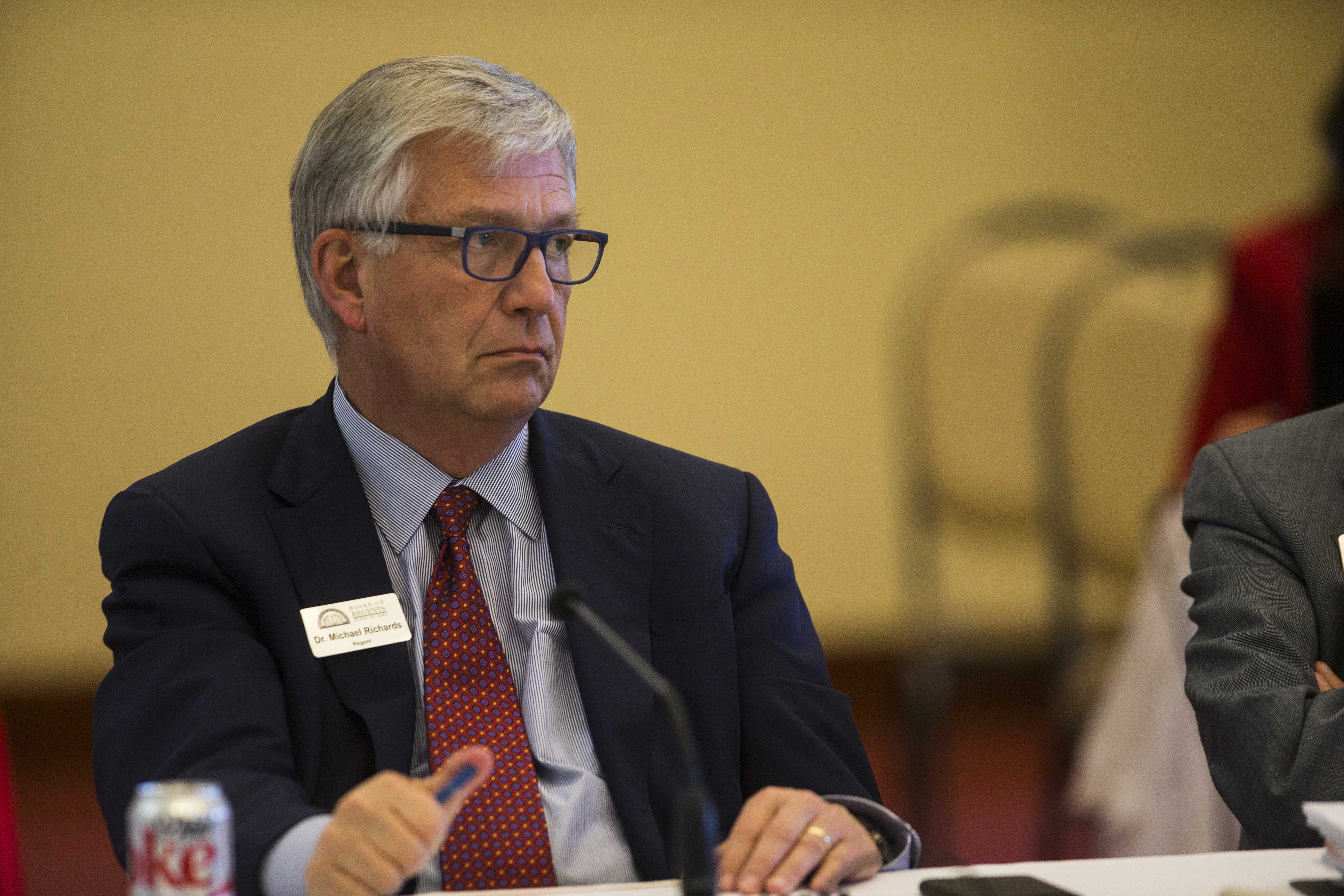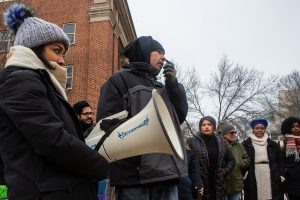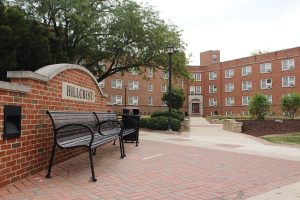UI Labor Center to remain open after regents’ vote
The state Board of Regents approved the UI’s request to reconsider closing the Labor Center on Feb. 28, after the College of Law dean and the center director reached an agreement to keep it open.
Crowd members move out of the meeting room to walk to President Bruce Harreld’s office during the Labor Center Statewide Summit in the Old Capitol Senate Chambers on Monday Dec. 3, 2018. Members of the university and the community addressed concerns over the Labor Center closure before taking their petition to Harreld’s office.
February 28, 2019
AMES — The University of Iowa Labor Center has been saved after the state Board of Regents approved the UI’s latest request to reconsider the closing on Feb. 28 with no discussion.
The regents approved the UI’s request to close the center and several others in November 2018, setting the center’s closing for June 30. They reversed that decision with the Feb. 28 vote; UI College of Law Dean Kevin Washburn and Labor Center Director Jennifer Sherer recently reached an agreement to keep the center open.
The initial decision to close the center stemmed from an administrative concern by its funding with tuition dollars and general-fund money. The new memorandum states general-education funding for the Labor Center will be eliminated, and after four years, the Labor Center will be self-sufficient.
Over the next four years, the law school, using unspent funds from the now-closed Institute of Public Affairs, will slowly phase out its financial support of the Labor Center, so by the time it completely withdraws, the center will have created and received its own streams of revenue.
“I believe strongly in the mission of the Labor Center and the community it supports,” Washburn said in a previous statement. “Providing supplemental funding until new sources of revenue can be secured is a positive outcome for the college and the center.”
RELATED: UI Labor Center’s closing official with Board of Regents’ approval
Ken Sager, the president of the Iowa Federation of Labor and Labor Advisory Committee member, addressed the regents during the public-comment period at the meeting, thanking them for the opportunity to reinforce the Labor Center’s role in Iowa.
With the center’s life on the line, Sager served alongside dozens of organizations, such as Iowa Professional Firefighters, the Interfaith Alliance of Iowa, Iowans for Public Education, and others on behalf of the Save Our Labor Center Coalition.
“I’m here as a lifelong Iowan and a parent of three graduates of regent institutions who have a deep love for our state and a personal stake in the rectification of our public institutions,” Sager said. “Today marks a turning point.”
Sherer recently told The Daily Iowan that in 1951, when the Labor Center was established, many states worked collaboratively with their public universities to establish labor-outreach programs. Post-World War II labor unrest grew as employers tried to claw back some of the wage and benefit gains workers made during the war years, she said, prompting states to find a role for themselves in resolving the tension.
Nearly seven decades later, the Labor Center’s outreach extends beyond the UI campus and to the rest of the state. Labor Center staff taught 2,556 Iowa workers from 61 Iowa counties in fiscal 2018 in classes on workplace safety, civil rights, injured workers’ compensation, family and medical leave, among other items, according to the center’s annual highlights report.
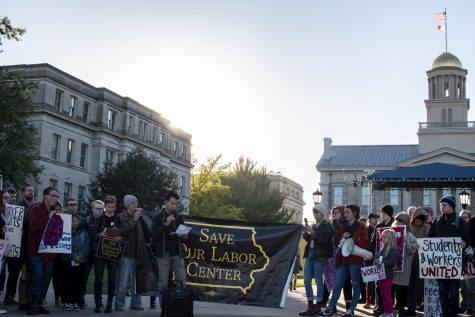
Community members gather on the Pentacrest to protest the closing of the Labor Center on Oct. 17, 2018.
“Workers should have access to understanding the legal framework they’re operating in, and management should as well,” Sherer said.
UI student Austin Wu, who was involved in the efforts to save the Labor Center, said one of his key issues with the center’s impending closing was that he felt it represented a divide between a prospering professional class and a stagnating working class.
“It’s kind of emblematic of what is the purpose of a public institution? Is it just to serve 18- through 24-year-old undergraduate students to receive degrees, or does it provide some broader purpose to benefiting the state?” he said. “While you can’t get a degree from the Labor Center, it provides training for people to stand up for themselves and sometimes even to save their lives.”
Women in male-dominated occupations have explained that the Labor Center gave them confidence to pursue leadership in the workplace, Sager said, noting that employees in hazardous jobs such as factory workers or first responders have gained the skills necessary to prevent injury.
“Over the 70 years the Labor Center has been in existence, it’s reflected a long commitment from the regents and the communities in which they work,” Sager said. “We hope that your continued stewardship of our public institutions will include a bright future for the Labor Center.”



